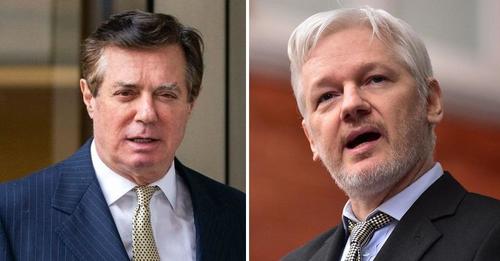British Press Literally Making Stuff Up About Manafort Meeting With Assange, Guardian Report Based on Fictitious Unnamed Sources and Fake Steele Dossier
WikiLeaks Categorically Denies Assange-Manafort Meetings
ZeroHedge.com
Update: WikiLeaks has fired back at the Guardian, tweeting: “Remember this day when the Guardian permitted a serial fabricator to totally destroy the paper’s reputation. @WikiLeaks is willing to bet the Guardian a million dollars and its editor’s head that Manafort never met Assange.”
This is going to be one of the most infamous news disasters since Stern published the "Hitler Diaries".
— WikiLeaks (@wikileaks) November 27, 2018
The Guardian‘s report was written by Luke Harding and Dan Collyns, and was based exclusively on unnamed sources.
***
Paul Manafort, Donald Trump’s former campaign manager, held secret talks with Julian Assange inside the Ecuadorian embassy in London, right around the time he joined Trump’s campaign, according to The Guardian, which as is now the norm in reports of this kind refers to unnamed “sources.”
Sources have said Manafort went to see Assange in 2013, 2015 and in spring 2016 – during the period when he was made a key figure in Trump’s push for the White House.
It is unclear why Manafort wanted to see Assange and what was discussed. But the last meeting is likely to come under scrutiny and could interest Robert Mueller, the special prosecutor who is investigating alleged collusion between the Trump campaign and Russia.
A well-placed source has told the Guardian that Manafort went to see Assange around March 2016. Months later WikiLeaks released a stash of Democratic emails stolen by Russian intelligence officers. –The Guardian
The 69-year-old Manafort has denied any involvement in the release of the emails, and has said that the claim is “100% false.”
While Manafort was jailed this year under a plea agreement with special counsel Robert Mueller, on Monday, Mueller said that Manafort had repeatedly lied to the FBI, breaching his deal. According to documents filed in court, Manafort committed “crimes and lies” covering a “variety of subject matters.”
According to The Guardian, Manafort’s first visit to the Ecuadorian embassy occurred one year after Assange was granted asylum inside, according to two sources. To add icing to the cake, “a separate internal document written by Ecuador’s Senian Intelligence agency and seen by The Guardian lists “Paul Manaford [sic]” as one of Assange’s several well-known guests, along with… “Russians.”
According to two sources, Manafort returned to the embassy in 2015. He paid another visit in spring 2016, turning up alone, around the time Trump named him as his convention manager. The visit is tentatively dated to March.
Manafort’s 2016 visit to Assange lasted about 40 minutes, one source said, adding that the American was casually dressed when he exited the embassy, wearing sandy-coloured chinos, a cardigan and a light-coloured shirt.
Visitors normally register with embassy security guards and show their passports. Sources in Ecuador, however, say Manafort was not logged. –The Guardian
So we have Manafort allegedly visiting Assange, in sandy-coloured chinos, and that Russians also visited the WikiLeaks founder. And none of this was known until today.
The Guardian goes on to suggest that “The revelation could shed new light on the sequence of events in the run-up to summer 2016, when WikiLeaks published tens of thousands of emails hacked by the GRU, Russia’s military intelligence agency. Hillary Clinton has said the hack contributed to her defeat.”
Note that The Guardian has considered the “hack” settled, which agrees with Western intelligence assessments (the same Western intelligence that conducted espionage on Donald Trump’s campaign). Nowhere to be found is the possibility that the emails were copied locally – a theory recently bolstered by a fresh analysis that flies in the face of a report commissioned by cybersecurity firm Crowdstrike – which was caught fabricating a report on Russia hacking Ukrainian munitions, and was forced to retract portions of their analysis after the government of Ukraine admonished them.
CrowdStrike has retracted statements it used to buttress claims of Russian hacking https://t.co/8AZOvoQl0K
— Michael Tracey (@mtracey) March 28, 2017
The Guardian goes on to link Manafort to “black operations” against the political rival of Ukraine’s former “Moscow-friendly president, Viktor Yanukovych,” and that Manafort “flew frequently from the US to Ukraine’s capital, Kiev – usually via Frankfurt but sometimes through London.”
Manafort is currently in jail in Alexandria, Virginia. In August a jury convicted him of crimes arising from his decade-long activities in Ukraine. They include large-scale money laundering and failure to pay US tax. Manafort pleaded guilty to further charges in order to avoid a second trial in Washington.
As well as accusing him of lying on Monday, the special counsel moved to set a date for Manafort to be sentenced.
One person familiar with WikiLeaks said Assange was motivated to damage the Democrats campaign because he believed a future Trump administration would be less likely to seek his extradition on possible charges of espionage. This fate had hung over Assange since 2010, when he released confidential US state department cables. It contributed to his decision to take refuge in the embassy. –The Guardian
And in perhaps the most shocking part of The Guardian‘s reporting, they refer to the highly salacious and largely discredited “Steele Dossier,” saying that according to the document, Manafort was at the center of a “well-developed conspiracy of cooperation” between the Trump campaign and the Kremlin, and that both sides had a mutual interest in defeating Clinton, wrote former MI6 spy Christopher Steele.
In a memo written soon after the DNC emails were published, Steele said: “The [hacking] operation had been conducted with the full knowledge and support of Trump and senior members of his campaign team.” –The Guardian
You know things are desperate when the Steele Dossier makes a guest appearance to once again bolster unsupported reporting.
